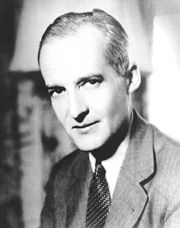Luis Federico Leloir | |
|---|---|
 An early photograph of Leloir in his twenties | |
| Born | September 6, 1906 |
| Died | December 2, 1987 (aged 81) |
| Nationality | |
| Alma mater | University of Buenos Aires |
| Known for | Galactosemia Lactose intolerance Carbohydrate metabolism |
| Awards |
|
| Scientific career | |
| Fields | Biochemistry |
| Institutions | University of Buenos Aires Washington University in St. Louis (1943–1944) Columbia University (1944–1945) Fundación Instituto Campomar (1947–1981) University of Cambridge (1936–1943) |
Luis Federico Leloir ForMemRS[1][2] (September 6, 1906 – December 2, 1987)[3] was an Argentine physician and biochemist who received the 1970 Nobel Prize in Chemistry for his discovery of the metabolic pathways by which carbohydrates are synthesized and converted into energy in the body.[3] Although born in France, Leloir received the majority of his education at the University of Buenos Aires and was director of the private research group Fundación Instituto Campomar until his death in 1987. His research into sugar nucleotides, carbohydrate metabolism, and renal hypertension garnered international attention and led to significant progress in understanding, diagnosing and treating the congenital disease galactosemia. Leloir is buried in La Recoleta Cemetery, Buenos Aires.
- ^ a b Ochoa, S. (1990). "Luis Federico Leloir. 6 September 1906-3 December 1987". Biographical Memoirs of Fellows of the Royal Society. 35: 202–208. doi:10.1098/rsbm.1990.0009. PMID 11622277.
- ^ With maternal name included (in usual Spanish-language practice) his name would be Luis Federico Leloir Aguirre, but the "Aguirre" is nearly always omitted.
- ^ a b "Biography of Luis Leloir". Nobelprize.org. Retrieved 7 June 2010.